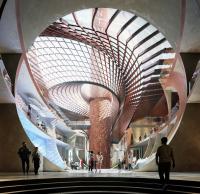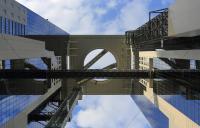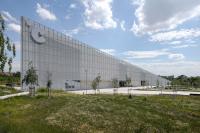Melbourne Brain Centre, University of Melbourne
Melbourne, Australia
The Melbourne Brain Centre is a significant building at the University of Melbourne, a gatepost at the main Royal Parade entry to the campus. We have resisted default ‘science = hi-tech rational object (read commercial)’ or ‘ESD ethics = bald aesthetics’ architectural strategies, in favour of a monumentally expressive campus architecture, undeniably whole and solid, concrete in its intentions.
The building is highly flexible and adaptable internally whilst the building’s exterior is constructed in robust materials both providing long term sustainable research into the condition of the brain. This building will become the home for a highly successful and sustainable collaborative research institution.
We conceived of the scientists as the ‘grey matter’, working as one for the greater good. Contained in a bone coloured precast shell they are revealed through large ‘collective’ windows incised in the casing. The design language throughout plays upon the idea of a split personality: left and right, black and white, light wood and dark wood. Bluestone and granite split the columns, making them look half as wide, twice as narrow.
The public zones within the building are located within a generous double height foyer which connects the reception and lift lobbies, cafe, bookshop auditorium and gallery. The public are invited to visually engage with the science spaces above via the two light filled atriums. The stairs within the atriums interconnect the four levels of laboratories and research offices. The super-labs are formally aligned along the south with the collaborative office space more informally to the north. The research offices gain access to shared lounges and meeting rooms. Generic, adaptable and future proofed facilities are designed in balance with customised laboratories for star scientists. The administration and staff collaboration lounge are located on Level 5 to gain views over Parkville. The biological resource facility is secure / hidden on the uppermost levels.
These technically demanding building types are Green Star resistant due to the high 24/7 energy consumption of the research ‘tools’. This building has attained an GBCA 5 star Green Star Design rating using the Educational Tool. It couples highly efficient floor by floor AC with occupant controlled mixed mode ventilation (operable windows and automated night purge via the atrium). A cogeneration plant reduces carbon footprint. The atria brings natural light deep into the interior. North, east and west façades are passively shaded.
The Melbourne Brain Centre project is overlayed with organisational complexity, incorporating a number of similar Institutes in a collaborative mash-up. Making new science through a creative competitive rub is a ‘briefed’ aspiration. The University and funding agencies stated a requirement for a building to ‘attract’ the best and brightest talent (in effect a reversal of the ‘brain drain’). We have designed less separation and more informal space to discourage silo formation and encourage discourse and social science respectively. An attractive workplace, adaptable laboratories and ‘integrated’ urban form will meet these requirements.














